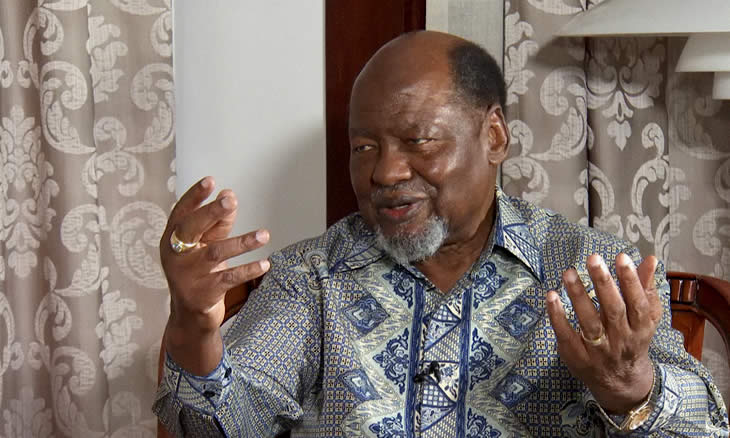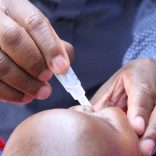Mozambique: Lawyers accuse Luanda court of vetoing judiciary mission
“We are all in the at-risk age group at this point in the pandemic” – Joaquim Chissano | Watch

Photo: O País
In an interview with STV, former president of Mozambique Joaquim Chissano said that we are all “in the at-risk age group at this point in the pandemic”, given that “it is not known where we might catch” the disease. Chissano believes the virus will pass once the necessary length time has gone by, and that “the important thing is that we stay alive [until then]”. But in order to do so, we must comply with health sector guidelines.
President Chissano, how do you analyse the new coronavirus pandemic, especially considering that President Chissano is a member of the at-risk age group?
You talk about the at-risk age. I would like to say that, in my opinion, in the at-risk age group at this point in the pandemic, because we do not know where we might catch it. You can catch it even in an environment just like this (interview), which we think is very well organised and where there is distance. But I got here, I sat on a chair, I grabbed the chair and I don’t know if the chair is completely disinfected. I may be the age I am, but I could be a young man who does the same thing. And, above all, young people may be unaware of all these factors. A little while ago, in the car, when I came here (for the interview), I saw four young men at ease, without masks and almost head-to-head, chatting and carrying a table. There they were… I don’t know how it all got transported over there.
So the lack of attention is great, in part because people don’t know what coronavirus is. First, they don’t know what a virus is. Is it something you see, something noticeable? When we wash, we at least see the dirt come off. But what is it? But let me say that I am clean!
The virus is a very small particle. I was doing a survey to find out how big a virus is. There are several types, but a virus in general. The biggest one I found is a millimetre across. A millimetre is little more than a grain of salt, and a coarse one at that. If we crush that grain of salt and produce smaller particles, we need to count a million small particles to make a grain which is one millimetre big.
This is to say that this cannot be seen with the naked eye, it can only be seen under a microscope, for those who know what a normal microscope is, the one used in the hospital to see some diseases. But you don’t see it there, because you need a high-powered microscope to be able to see this small element that we used to call a bug, but it’s not a bug at all. It is a kind of a powder, a grain of dust, let’s call it, because according to the explanation that was given it is covered with a kind of grease The fabrics, the doors, the furniture, the door locks – anything you touch you should do so carefully, because this virus may be there. But the most common way of transmitting is through people when they speak. For example, I’m here to talk and if I start to touch or to sneeze, so my saliva goes through the air and falls on the surface. It is often said that this happens less than a metre away, but in a place where there is a little more wind, it may spread a little more, so one can never be too careful.
Therefore, the greater the distance in which we can be living, the better, but not less than 1.5 metres. So, this is a danger for everyone, there should be no argument that I have not yet reached age X, so I am less vulnerable. Me, at my age, obviously I am taking extra precautions, but I have told many people that it is not the age that marks the time when you are going to die. I heard that there was a baby who died and I’m still alive!
President Chissano talks about redoubling care, and you also said that you had the opportunity to testify that some people are not complying with these preventative measures with due rigour. How should we mobilise people to comply?
What I was trying to do is explain what the disease is, what the virus is, that it really exists and that for us not to catch the disease we need to take precautions. The precautions are those that are already well known. First, social distancing in everyday life, which cannot be less than 1.5 metre. But, as I already said, it has to be more than 1.5 metre. And if we do not comply, we may regret it, because we will not know whether it was when talking to Mr or Mrs so-and-so that I caught it.
In order to treat the disease, it is necessary to establish all the people with whom you have had contact, which can make things difficult.
Even once the danger is known, the main danger is that the remedy is not yet known. There is no medicine for it. For the time being , we treat the cough when the person has a cough, the fever when the person has a fever, the diarrhoea when the person has diarrhoea, conjunctivitis when the person has conjunctivitis, etc. But the medicine for killing this virus is not yet known. Madagascar is using a medicine which, if proven effective, we will adopt as a treatment. I am not against people experimenting. We all eat, and if that food serves to strengthen us, it is for the best, but it does not mean that is a medicine.
For example, we have to take vitamin C and it is known that the orange has vitamin C. But it is not by eating the orange that vitamin C will have any results. Eucalyptus, I see a lot of people selling it on the street, maybe it will (bring positive results). It must not be forbidden for people to protect themselves in the best way, but they must not think that they are already protected because they are doing that. I heard about other procedures, like throat cleaning, and I heard a doctor in Angola talking about other procedures that I can adopt, but that doesn’t mean that they will cure me.
But are you consuming any product for this purpose?
I gargle with salt water at least twice a day. Sometimes three times a day, because of the explanation that this doctor gave, but that’s it. If it doesn’t correspond to the truth, at least it won’t kill me. But I do not do this because I am convinced that this is a medicine, that is, until scientists collectively pronounce that this is the way forward. So, it is not because I am doing this that I will stop taking other precautions. I wear a mask, even at home, and my family do too, and we are well.
President Chissano, a look at the economic impacts of this pandemic, considering that the economy is inanimate and unemployment is already a reality. More than 15,000 companies face possible bankruptcy, and also this environment of uncertainty that is created. How are we to rescue the confidence of the population?
The confident say that this is an epidemic like many others, and that they have their moment and go away. In my language it is called “muzungu”, that is, it attacks goats and chickens and goes away after a certain amount of time. This epidemic disease will also go away, but for it to go away quickly it is necessary to take all the precautions that are recommended. But endemics always pass, This is not the first serious one – there are many in history.
What should politicians consider when managing a crisis generated by a pandemic of this nature?
The country has to offer as much support as possible. But, of course, it cannot do everything – people also have to be more imaginative.
But what in particular should politicians consider when managing a crisis like this?
What I said: support the population affected by the pandemic. For example, we are all staying at home and the production that we accomplished [before] is hampered. So we have to find ways to compensate. I was pleased to hear that the price of gasoline fell. I don’t know if it was the government’s decision or the market acting by itself. Diesel has gone down, and the government has made an effort to subsidise cotton, another related measure. Many other measures of a financial nature have also been mentioned. Banks also have their contribution to make, but the important thing is to ease the burden on citizens who cannot produce completely or freely. The essential thing is to help people to endure this pandemic.
Human beings are social and like to live together, it is a characteristic that is inherent in our nature. And the bottom line at this point is confinement, social distancing, all that goes against human nature. What message of comfort is there for people at this point in time?
It is better for us to live, than to live together. I don’t know if I’m making myself understood, but, in order to live together it is necessary first to live. It is better to defend life first and foremost, so that we can continue to live together, have parties, go to the movies, etc. The main thing is that we preserve our lives and the lives of others, the ones we want to live with. The others at home, at work, in sports; we have to protect ourselves so that we can continue playing our football later, even if the disease lasts for another three months, four months, five months… It doesn’t matter; the important thing is that we stay alive.
Interview by Olívia Massango












Leave a Reply
Be the First to Comment!
You must be logged in to post a comment.
You must be logged in to post a comment.